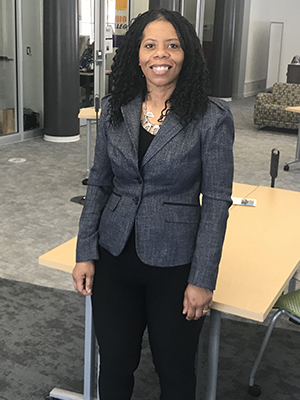Elizabeth Rudolph Finds Her Passion as Albion College’s New Director of Accessibility Services
The Albion native helps a diverse student population navigate the mental and physical challenges of today’s world.
March 16, 2021
By Chuck Carlson

Elizabeth Rudolph, director of accessibility services, stands in the new Stockwell Library space for the Cutler Center for Student Success and Academic Achievement. “The word is getting out about the Cutler Center,” she says. “But we’d like to get it out even more.”
When Elizabeth Rudolph was a middle school student in Albion, a classmate’s dad, who was a psychologist at the Kalamazoo Psychiatric Hospital, came in to talk to the class about his job.
When he was done, she was hooked.
“I said, ‘That’s what I want to do,’” Rudolph said. “I just loved it.”
From then on, Rudolph has made it her career, and her passion, to help people who need it in so many ways.
In 2016, after working at LifeWays Community Mental Health in Jackson, she came to Albion College as a learning specialist and then assistant director of disability services. When longtime director Pam Schwartz retired late last year, Rudolph was promoted with a new title but with a similar focus and is now director of accessibility services and campus disability officer.
Now under the auspices of the Sarah S. and Alexander M. Cutler Center for Student Success and Academic Achievement, located in Stockwell Library, Rudolph’s goals are similar, even if her title has changed.
“We’ve changed from disability services to accessibility services,” she said. “It helps reach a wider range of people who maybe didn’t think they had disabilities. There’s a misconception about the services. The Americans with Disabilities Act defines a person with a disability as a person who has a physical or mental impairment that substantially limits one or more major life activity. Most people think of only physical disabilities, but invisible disabilities such as depression and anxiety are also included. Eligibility for services in college all depends on whether or not it impacts your education.”
Indeed, she says most of the students who use the services come in with already diagnosed disabilities, but in the past year the COVID-19 pandemic has led to its own share of emotional problems. And Rudolph wants students to understand that the umbrella of understanding and cooperation is expansive and open to everyone.
“We’re a resource,” she said. “Use it. Don’t wait until you’re in trouble; although we still want to see you then, we would prefer to be preventative.”
‘Unwavering Professionalism’
Rudolph works closely with the College’s Office of Counseling Services but makes clear she does not engage in therapy. She offers a place for students to talk; if more treatment is necessary, they are referred to Counseling Services and vice versa.
“There are so many parts to this job,” Rudolph said. “As director of accessibility, it’s more about delivering services to students. I do individual coaching with students and sometimes they just want to come in and talk about issues or how they’re feeling. This position lends itself to belonging [on campus] and the feeling of belonging. I really love the work of talking one-on-one with students.”
Dr. Shannon O’Neill, associate dean for student success and Cutler Center director, knew Rudolph’s interpersonal skills would make her the ideal choice for the director role.
“It’s her unwavering professionalism and her caring approach,” Dr. O’Neill said.
As well, both Rudolph and Dr. O’Neill believe the Cutler Center, which moved into its Stockwell space in January, is uniquely positioned to provide these services.
“It’s just more accessible for students because it’s in a space where students are already in,” Dr. O’Neill said. “Students are utilizing the service and they’re using it for a wide range of issues.”
“The word is getting out about the Cutler Center,” Rudolph said. “But we’d like to get it out even more. And I think the Cutler Center has been able to draw a more diverse crowd as well.”
‘This Is Home’
Rudolph began her journey at Eastern Michigan University, where she earned her bachelor’s degree in psychology. She later received a master’s in counseling psychology at Western Michigan University.
And after working several years in Jackson, the Albion High School graduate had the opportunity to come back home to do what she loves best.
“I lived in Albion even when I worked in Jackson, and I was happy to be able to live and work here,” she said. “This is home.”
She has also been able to see how the College has evolved since her time growing up here.
“There are a lot of Albion High School graduates who work here now, and I think it would be nice if the community knew that,” she said. “For me, it’s important that we continue to build a bridge with the community.”
In the end, though, for Rudolph it all goes back to that pivotal day in middle school when she realized what she wanted to do when she grew up.
“I have to admit when students today tell me they don’t know what they want to do for a career, I tell them to consider this,” she said, referring to the accessibility services profession. “I didn’t know I’d end up on the education end of psychology, but I’m so glad I did. I get a chance to meet such a diverse group of people and I continue to learn, too. I learn every day.”